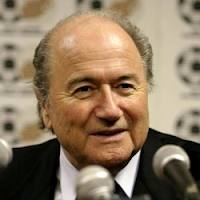By Andrew Warshaw, Chief Correspondent
February 11 – FIFA president Sepp Blatter has hit back at criticism by UEFA of the reform process he instigated almost two years ago in the wake of widespread corruption. The reform process will reach its eagerly awaited conclusion at the FIFA Congress in May.
Blatter chose a round-table media conference in South Africa just before the African Nations Cup final to express his disappointment at UEFA’s public statements of opposition to many of the reform ideas, designed to bring about greater transparency at the heart of football’s world governing body.
The proposals have been drawn up by Swiss law professor Mark Pieth, head of FIFA’s Independent Governance Committee (IGC), but UEFA recently issued a blueprint of their own, appearing to block many of Pieth’s proposals including instigating special credibility checks for key officials.
Pieth, whose recommendations were circulated to FIFA member nations through their confederations for consideration, has already expressed his own annoyance at Uefa’s position, suggesting it will “basically try to cut half” of the modernising agenda.
Pieth was especially disappointed with UEFA’s declaration rejecting a proposal to limit FIFA executive members to two four-year mandates. UEFA, keen for one of their own to take over from Blatter in 2015, also called for future FIFA presidents to serve a maximum of 12 years rather than the suggested eight put forward by the IGC.
With Europe’s 53-nation membership likely to vote as a block in May, the entire FIFA reform process could face a serious threat in Mauritius and Blatter says European members were not supposed to issue a unilateral stance.
“I’m surprised by the reaction of UEFA,” said Blatter. “The executive committee told the confederations to consult their national associations about the reforms . . . I’m surprised because it did not seem like a consultation, it seemed like it was decision-making from UEFA.”
“The idea was that at the FIFA Congress, all national associations have the right to speak on the amendments in favour or against. We have asked the confederations to make consultations; we have not asked them to make decisions.
“If all the Confederations make decisions, what is the point of the FIFA Congress?”
UEFA suggested that an independent vetting process for key officials was not necessary. But after so many widely reported cases of impropriety over the last couple of years in FIFA’s inner sanctum Blatter couldn’t understand why European members were against a fit and proper persons test.
“What is important to me and I will defend it, is that all members of FIFA shall have a scrutiny check, because everyone working somewhere has one,” he said. “All the referees and linesmen on the FIFA list have to have one and sign a document which is recognised by their national association.
“So if it is good enough for FIFA referees, why should it not be the same for the FIFA executive committee and all the members of FIFA? Why is UEFA now against this? I don’t understand it.”
Blatter also, not for the first time, addressed the issue of a possible fifth term of office in 2015. His opposite number at UEFA Michel Platini, influential Spanish powerbroker Angel Villar-Llona and Jerome Valcke, the FIFA secretary-general, are all considered possible contenders as his successor and Blatter again teased his audience by refusing to confirm 100% that he would step down.
“My [current] mandate ends in 2015, if God gives me my health . . . I know I have to stop, but I don’t know when I will stop,” he said.
If his own reform rules are passed he will not be able to retain his position as he will already have held the job longer than the eight years the new regulation would stipulate.
Contact the writer of this story at moc.l1745118643labto1745118643ofdlr1745118643owedi1745118643sni@w1745118643ahsra1745118643w.wer1745118643dna1745118643

